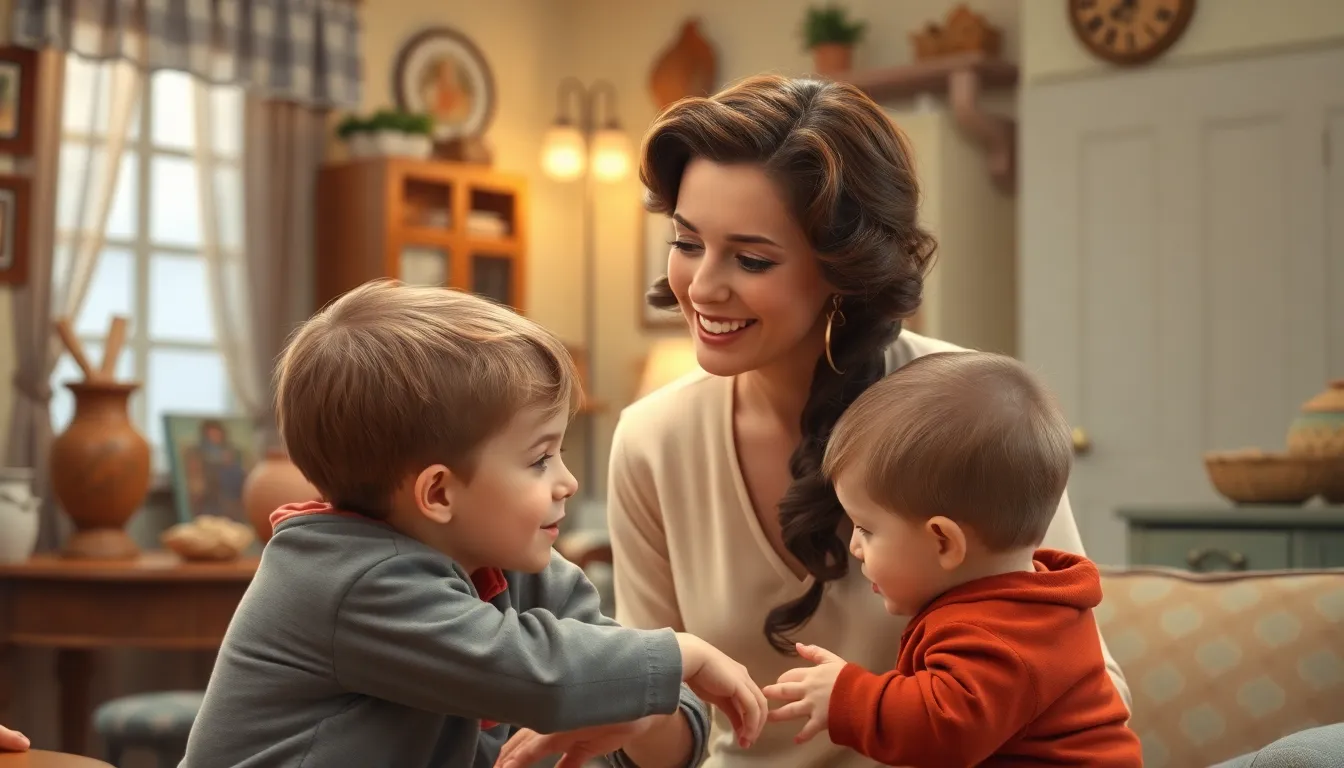When it comes to parenting styles, authoritative parenting takes the cake—it’s like the Goldilocks of child-rearing: not too strict, not too lenient, but just right. Movies often reflect this balance, showcasing parents who guide their kids with a firm hand and a loving heart. Think about it: which film parent do you secretly wish was yours?
From the wisecracking yet nurturing figures to the ones who manage to blend discipline with a dash of humor, these cinematic examples offer more than just entertainment. They provide a blueprint for how to raise resilient, well-adjusted kids while still being the cool parent. So grab your popcorn and get ready to explore some of the best authoritative parenting moments that not only make us laugh but also inspire us to be better parents.
Table of Contents
ToggleUnderstanding Authoritative Parenting
Authoritative parenting represents a balanced approach that blends structure with affection. It encourages children’s independence while maintaining necessary limits.
Definition and Characteristics
Authoritative parenting emphasizes open communication, setting clear expectations, and fostering emotional support. Parents exhibit warmth, encouraging their children to express feelings and thoughts. Discipline occurs through reasoning rather than confrontational methods. Respect is mutual, with parents valuing children’s opinions while enforcing boundaries. This style results in well-adjusted children who are self-reliant and socially competent.
Importance in Development
Authoritative parenting plays a crucial role in healthy child development. Studies indicate these children often display higher self-esteem and better academic performance. They tend to develop strong social skills, allowing for positive interactions with peers and adults. Supportive environments foster resilience, enabling children to tackle challenges effectively. Also, they learn to navigate relationships, developing empathy and understanding of others.
Notable Authoritative Parenting Examples in Movies

Movies often present outstanding representations of authoritative parenting. Characters exemplifying this style balance warmth and discipline, providing valuable lessons for viewers.
Classic Movies
In “The Sound of Music,” Maria embodies authoritative parenting through her nurturing approach with the von Trapp children. She encourages their independence while setting clear boundaries. Another example is “Little House on the Prairie,” where Caroline Ingalls demonstrates strong yet compassionate guidance, fostering emotional growth and resilience. Both films highlight the importance of communication and reasoning in parenting, promoting children’s development within structured environments.
Contemporary Films
More recent films like “Finding Nemo” showcase authoritative parenting through Marlin’s supportive journey as he navigates challenges to find his son. He combines protective instincts with encouragement for Nemo’s exploration of the ocean. In “The Pursuit of Happyness,” Chris Gardner provides a powerful example of dedication, blending discipline with love while facing immense struggles. These narratives underscore the significance of empathy and understanding in effective parenting, illustrating how these traits foster well-adjusted children.
Analyzing Key Scenes
Scenes in movies often highlight authoritative parenting through meaningful interactions between parents and children. These moments illustrate the essential traits of warmth, discipline, and open communication.
Positive Interactions
Maria from “The Sound of Music” creates a nurturing environment, encouraging the von Trapp children to express themselves freely while maintaining structure. Her ability to blend fun with learning portrays authoritative parenting effectively. Caroline Ingalls in “Little House on the Prairie” models strong parenting by setting boundaries and showing empathy towards her children. These filmmakers showcase the way positive interactions foster respect and understanding. Additionally, Marlin in “Finding Nemo” demonstrates protective instincts while allowing his son Nemo to explore the world, illustrating balance between safety and independence. Each character exemplifies how fostering open dialogue strengthens relationships.
Lessons Learned
Key lessons arise from these cinematic examples. Children thrive in environments where expectations are clear and affection is prevalent. Characters like Maria emphasize the importance of teaching responsibility through gentle guidance. By addressing challenges with love, these parents instill resilience in their children. Marlin’s journey highlights the value of encouraging independence while providing support, reinforcing emotional strength. Films like “The Pursuit of Happyness” further assert that empathy during struggles leads to stronger parent-child bonds. Each lesson emphasizes that a blend of warmth and structure prepares children for real-world situations.
Impact on Viewers
Cinematic portrayals of authoritative parenting resonate deeply with viewers. These films depict relatable characters who navigate the challenges of parenting while maintaining balance between affection and discipline.
Relatability and Inspiration
Characters faced with common parenting dilemmas inspire viewers. Audiences connect with their struggles, fostering a sense of understanding. Mary Poppins’ magical approach to nurturing encourages parents to blend structure with creativity. Likewise, Marlin from “Finding Nemo” embodies the protective yet encouraging aspects of authoritative parenting. His journey emphasizes the importance of trusting children as they explore independence. These relatable examples motivate parents to adopt similar techniques, cultivating a more nurturing atmosphere at home.
Cultural Reflection
Movies often mirror societal values through parenting styles. Authoritative parenting highlighted on screen reflects growing recognition of emotional intelligence. In “Little House on the Prairie,” Caroline Ingalls exemplifies compassion and discipline, showcasing cultural importance of family unity. Films like “The Pursuit of Happyness” emphasize resilience and determination, reinforcing belief in nurturing traits. These cinematic examples address contemporary parenting issues, encouraging discussions about values and responsibilities. Through diverse narratives, viewers gain insight into effective parenting strategies, fostering stronger connections within families and communities.
Cinematic portrayals of authoritative parenting offer valuable insights into balancing discipline with warmth. These films inspire parents to embrace a nurturing approach that fosters independence while maintaining necessary boundaries. By showcasing relatable characters facing common challenges, movies encourage viewers to reflect on their parenting styles and adopt techniques that promote resilience and strong family bonds.
The lessons learned from these narratives highlight the importance of open communication and emotional support in raising well-adjusted children. As audiences engage with these stories, they’re reminded of the profound impact of authoritative parenting on children’s development, equipping them with the skills to navigate life’s complexities with empathy and confidence.








